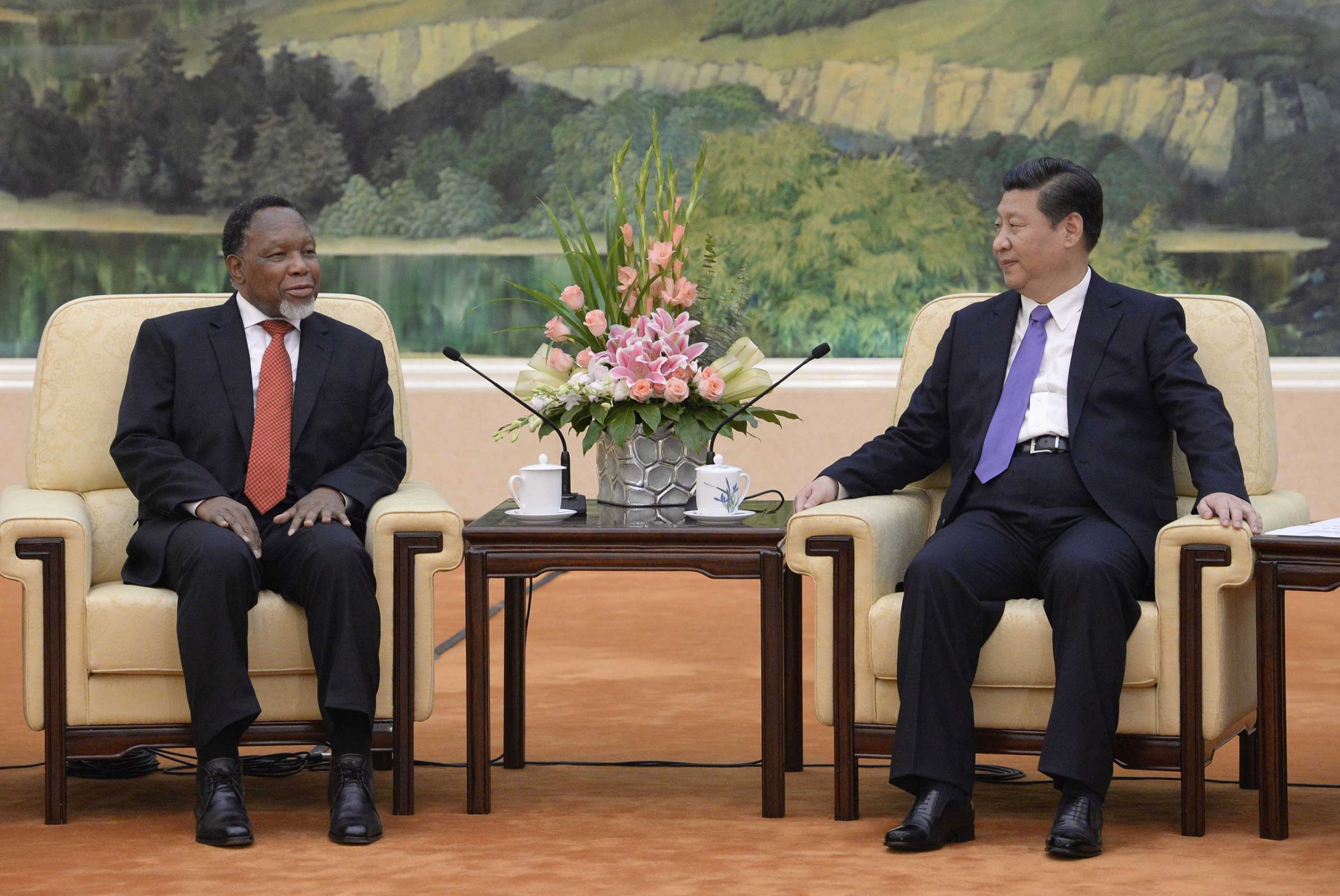
Most South Africans don’t visit Venterskroon, a former gold-mining town, unless they are going there on vacation. It was the site of an inconclusive battle between the British and the Boers in 1900 but today the handful of mostly white landowners harvest pecan nuts or raise cattle while vacationers trek in the bush and fish in the Vaal River.
But the sleepy Afrikaner village is about to be transformed. It is slated to become the home of the African National Congress’ (ANC) new political leadership school, a project inspired and financed by the Communist Party of China, a burgeoning partnership of ruling parties on different continents that is causing concern in South Africa and beyond.
The ANC Political School and Policy Institute, which will include a swimming pool, halls, a fitness center, a pharmacy and a small shopping center, is due to be built on what is now a farm, which the ANC bought in 2010. Construction has been postponed while funding and planning issues are addressed.
The ANC says the institute will be modelled on the China Executive Leadership Academy Pudong in Shanghai, one of the Communist Party’s leadership and governance schools where party members and foreign guests attend classes on “revolutionary traditions,” learning everything from Marxist theory to media management.
In July, a Chinese delegation led by Tian Xuejun, China’s ambassador to South Africa, travelled to Venterskroon to see the site. They met with ANC Secretary General Gwede Mantashe and Nathi Mthethwa, South Africa’s Minister of Arts and Culture and the ANC’s Chairman of Political Education, to discuss $75 million in funding. (The Chinese embassy in South Africa did not respond to requests for comment.)
“We’ve been talking to people around the world, our friends; the Communist Party of China is one of those,” says Mthethwa. “We said to them, ‘Now look, we know that you have a political school, how did you start it?'”
The ANC’s courting of China has caused concern in the West. “In the worst case scenario, Chinese money in significant amounts and influence could tip the ANC in the wrong direction,” says Peter Pham, Africa analyst at the Washington-based Atlantic Council. “With the ANC being the way it is, if there is a heavy hand in the support, potentially it could result in shifts in governmental policy.”
The domination of South African politics by the ANC, and its members, known as cadres, can make South Africa seem like a one-party state, says Patrick Heller, international studies professor at Brown University. “Like any party in power for too long — the ANC has won every election since 1994 with over 60% of the vote — the ANC has amassed a tremendous amount of power. That power is increasingly centralized. That party itself is increasingly less accountable,” says Heller. “It’s hard to think of any better example of a cadre-based political party than the Chinese Communist Party but it’s the wrong model because at the end of the day it’s an authoritarian one,” he says. “Developing close personal relationships between the ANC and the Communist Party of China means you’re basically greasing the wheels and making it easier for the Chinese state and Chinese entrepreneurs. That is definitely not good. You want good bureaucratic management of these issues, not crony capitalism.”
As far as China is concerned, says Alexander Beresford, African politics lecturer at the University of Leeds, funding the ANC’s political school does not violate its non-interference policy, as the relationship is at a party-to-party level. “It’s not necessarily regular state-to-state relationships, Pretoria to Beijing style, but having other channels of influence,” says Beresford. “Exploiting these party-to-party channels gives it a strategic advantage over Western powers.”
China has been reaching out to ruling parties in other African countries also. In his book China and Africa: A Century of Engagement, former U.S. ambassador to Ethiopia David Shinn chronicles how China has offered political education training for parties including Tanzania’s Chama Cha Mapinduzi party, Zimbabwe’s ZANU-PF and Namibia’s SWAPO. “It is provided at the request of African ruling parties,” says Shinn. “They may still prefer elements of Marxist-Leninist organizational structure, or at a minimum, the once-popular philosophy of African socialism.” The arrangement is usually an exclusive one. “China does not provide similar training for African opposition political parties,” says Shinn. In return, China wins friends and favors, he says, gaining “influence at the highest levels of government.”
The school is part of a bigger ANC strategy to counter the widespread corruption and nepotism the party has seen since Nelson Mandela was elected the country’s first black president in 1994. The ANC declared 2013-2023 the “decade of the cadre,” with the goal of putting every party member through some kind of political school. “Every cadre of the movement must have integrity for our people to have confidence,” said Mantashe in a 2013 ANC newsletter. “We must be bold in dealing with deviant behaviour.”
Whether the political training will help South Africa and other African governments end corruption in government is a different question. China has a network of political schools and yet it is still experiencing massive graft scandals involving senior officials.
The ANC is prepared to take that risk. And it will do so no matter what its critics say. The ANC’s partnership with China’s Communist Party, Mthethwa says, is its own business: “Nobody will dictate to us who our friends are.”
More Must-Reads from TIME
- Donald Trump Is TIME's 2024 Person of the Year
- Why We Chose Trump as Person of the Year
- Is Intermittent Fasting Good or Bad for You?
- The 100 Must-Read Books of 2024
- The 20 Best Christmas TV Episodes
- Column: If Optimism Feels Ridiculous Now, Try Hope
- The Future of Climate Action Is Trade Policy
- Merle Bombardieri Is Helping People Make the Baby Decision
Contact us at letters@time.com